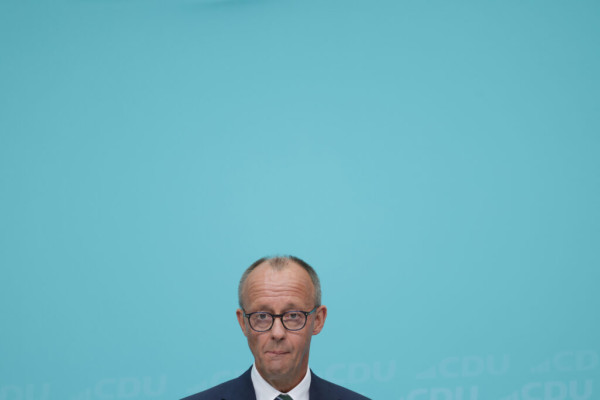Berlin livid as UniCredit tightens its grip on Commerzbank
In the battle for Commerzbank, the gloves are off.
Things hit fever pitch on Monday after Italy’s UniCredit, led by veteran dealmaker Andrea Orcel, announced out of the blue that it had entered into derivatives transactions that would raise its stake in Germany’s second-largest bank to 21 percent, making it the largest shareholder.
That prompted a furious reaction from German Chancellor Olaf Scholz, who denounced the move as an “unfriendly attack,” and damned what he called efforts “to aggressively acquire stakes in companies without any cooperation, without any consultation, without any feedback.”
The exchange highlighted how sensitive and protective national governments are about control of their domestic financial sectors, despite years of endlessly calling for Europe to complete its banking union and capital markets union. Those calls that have acquired a fresh urgency since Mario Draghi laid bare how far the European Union has fallen behind the U.S. and China.
It also appeared to kill, in the near term, any chance of UniCredit taking control of Commerzbank and merging it with its current subsidiary HypoVereinsbank, to create what would be the largest bank in Germany and one of the largest in Europe. The hope that Commerzbank, whose share price has languished for 16 years, might one day be as valuable as UniCredit, appeared to die with it: its stock fell 5.7 percent in Frankfurt.
“Berlin obviously doesn't want to see a large German bank in Italian hands,” Lucas Guttenberg, a senior advisor with the Bertelsmann Foundation in Berlin, said via X. “So we can spare ourselves a lot of waffle over the completion of Banking Union. If market solutions like this aren’t acceptable, then the whole construct is out of kilter.”
Merz revels in government discomfort
Back in Berlin, meanwhile, Christian Democratic Union leader Friedrich Merz took the opportunity to blast what he said was “amateurish” management of the sale by the three-party federal government. The finance ministry had announced earlier this month it would look to unload a stake that it had taken at the height of the 2008 crisis, despite having to realize a heavy loss. Finance Minister Christian Lindner, under pressure to plug holes in his budget draft for 2025, had said the government was “committed to economic efficiency.”
However, Scholz, Lindner and their allies in the Green Party had assumed that they could sell down their stake without risking a foreign takeover, even though UniCredit, BNP Paribas and Dutch-based ING had all reportedly expressed interest in buying out Berlin’s holding over six years ago.
Commerzbank’s relative strength has traditionally been in banking to Germany’s Mittelstand, the medium-sized companies that make up the backbone of its economy. As such, German politicians have been uneasy about seeing control of it pass to a bank in another country, afraid that the parent bank might cause a credit squeeze in Germany if it ran into difficulties at home.
Having committed to auctioning a 4.5 percent stake (just over a quarter of its total holding), the government had no option but to sell the whole block to UniCredit when the bank handsomely outbid all the other participants. At the same time, the Italians revealed that they had accumulated another 4.5 percent via the open market and Orcel said that it would apply for permission to raise its stake further.
That immediately sparked fears among Commerzbank’s unions that UniCredit would use a subsequent merger to cut thousands of jobs. Commerzbank’s board, chaired by former Bundesbank President and advisor to Angela Merkel Jens Weidmann, fretted about the loss of the bank’s independence. That pressure resulted in the government signalling already on Friday that it wouldn’t sell any more of its remaining 12 percent holding, for the time being.
In a press conference on Monday, Merz made the most of the disarray, gloating that “whatever was planned by the federal government in this transaction has obviously gotten completely out of control.” The sale process, he asserted, was “the handiwork of dilettantes” and “at the end of the day, a disaster for the German banking market.”

UniCredit, unsurprisingly, took a different view, suggesting that it would be doing Germany a favor by making Commerzbank a more efficient institution.
“Ensuring growth and competitiveness within the German banking sector is critical for both the German economy and for Europe as a whole,” it argued.
It left open the possibility of leaving Commerzbank to run itself, saying “there is substantial value that can be unlocked within Commerzbank, either stand-alone or within UniCredit.” But it made clear that that value would not create itself, saying: “ Such potential requires action for it to be crystallized.”
Additional reporting by Johanna Treeck and Nette Nöstlinger.